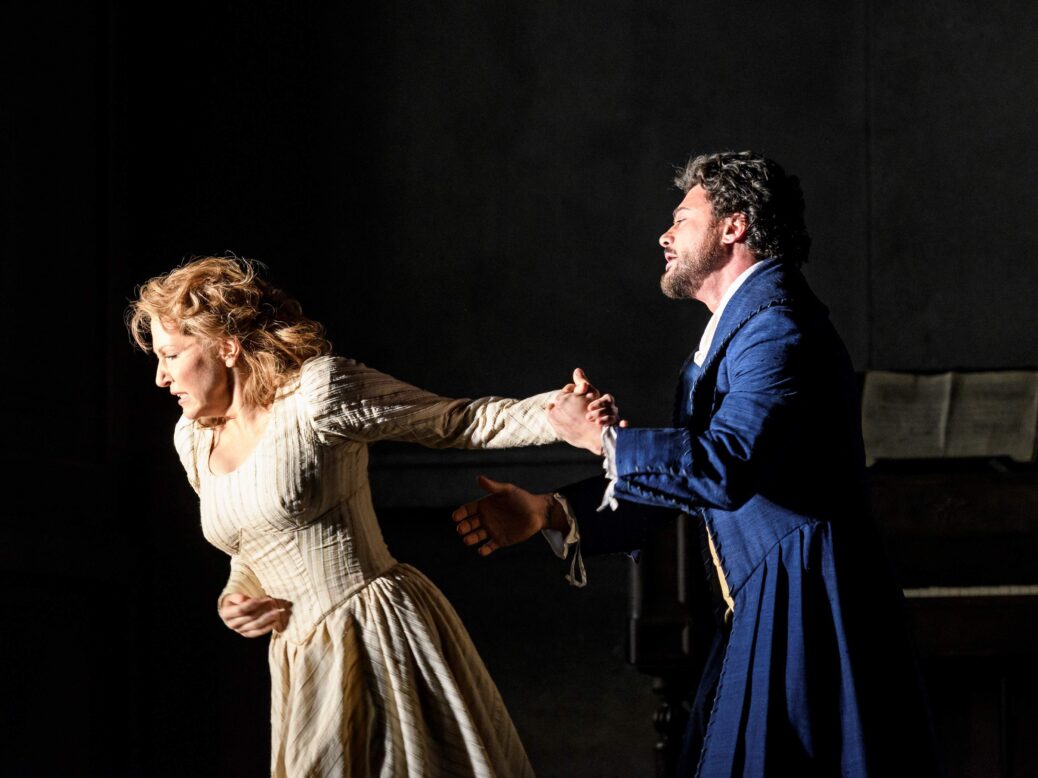
Benoit Jacquot’s Werther looked old-fashioned at its debut in 2004. By 2011 it was a quaint piece of throwback theatre. Now, on its third outing, it is positively pensionable. Charles Edwards’s sets are handsome enough – cobbled courtyards giving way to moody Hammershøi interiors – but oddly inert, a pretty frame for an ugly story. There’s little revival director Andrew Sinclair can do to pour life into this period piece, but he’s spared the bother of really trying by two leads whose performances find all the psychological detail the production lacks.
I’m not sure, however, that the story Joyce DiDonato and Vittorio Grigolo (making their stage debuts as Charlotte and Werther respectively) tell us so vividly is the same one Antonio Pappano and his musicians in the pit are busy narrating. Pappano’s Werther is still heart-on-sleeve stuff, all surging brass and swooning strings. It’s emphatically a romance, albeit a tragic one, complete with solo strings that echo and double the on-stage nearly-but-not-quite-lovers. But in DiDonato and Grigolo’s hands it’s something much darker.
DiDonato’s Charlotte was always going to be fascinating. How would a singer of such energy, such an active force on stage, tackle a character whose defining characteristic is not doing – not kissing Werther (until too later), not defying her mother’s wishes, not allowing herself to feel or act on her desires?
Taking all that energy and pushing it inwards, DiDonato gives us a Charlotte with a complicated inner life – outwardly quiet and self-possessed, but only at a cost. That cost becomes suddenly and violently visible in Act III, where a protracted moment of stillness, back to the audience, releases into a volatile sequence of emotions (“Ah! mon courage m’abandonne”/”Va! laisse couler mes larmes”). This Charlotte is no prig, but a woman old beyond her 20 years, in the habit of duty and obedience, of putting her own wishes last.
DiDonato’s reading of Charlotte’s love as a slow-burn passion, creeping gradually into focus, leaves us little choice but to suspect the insta-ardour of Grigolo’s Werther. This young lover yearns and burns from their earliest encounter, forcing his feelings repeatedly at a woman who declines them. Fortunately Grigolo has the vocal power and stamina to carry off this grand passion. While DiDonato paces herself carefully (perhaps too carefully, at the start), Grigolo comes in at full power and maintains that intensity over the whole course of the opera.
What’s more surprising, perhaps, in this role debut is the subtlety and expressive range Grigolo finds for Werther’s rather one-dimensional emotions, placing his voice with care and unexpected delicacy for “Pourquoi me réveiller”, and giving us a death scene of tremendous tenderness. But for all its musical delights, the relationship that emerges here is one more dysfunctional than most – an obsessive, destructive force in which Charlotte is more victim, or passive recipient, than co-creator.
DiDonato and Grigolo are aided by as strong a supporting cast as this production has yet fielded. The stand-out is Heather Engebretson’s Sophie – guileless in her joy, all vocal bloom and sweetness of tone, but there are also strong turns from drunken duo Johann and Schmidt (Yuriy Yurchuk and Francois Piolino), and a warmly sung if dramatically understated Albert from David Bizic. If Massenet’s opera still feels a little slight, short on action and long on emotion, then that’s an issue better productions that this have still failed to solve.



